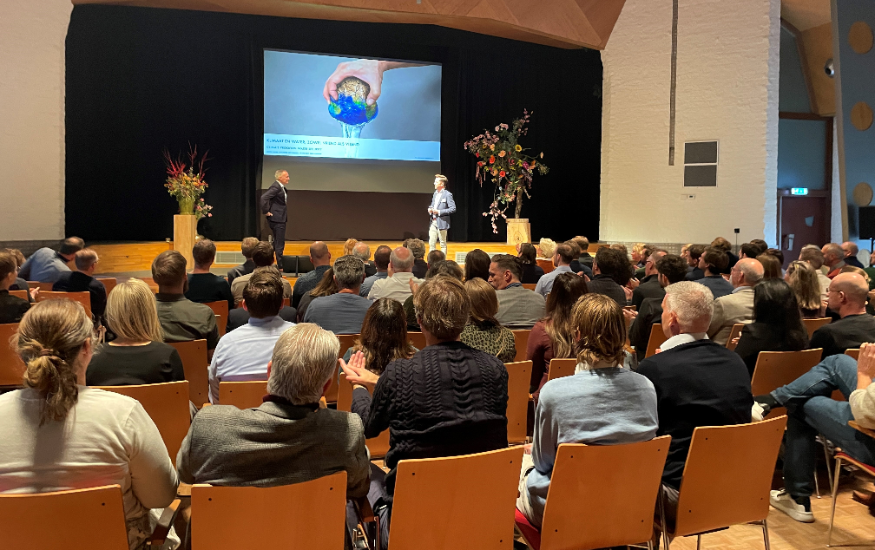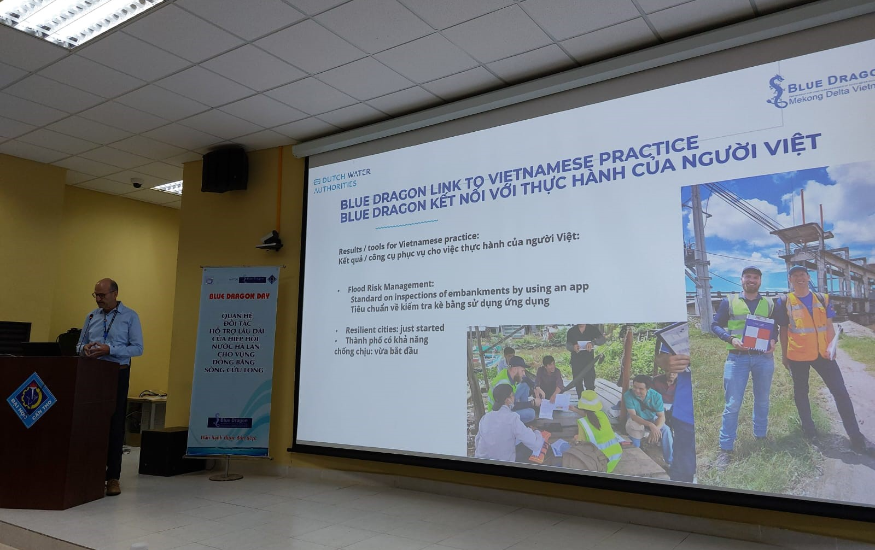On November 27, Dutch Water Authorities (DWA) organised the DWA Network Day in Driebergen, with the central theme 'Water Knows No Boundaries.'

DWA coordinator Piebe Hoeksma opened the day with a plenary conversation with Luzette Kroon, board member of the Association of DWA. After a presentation by former Chief of the Defence Staff Tom Middendorp and the presentation of the NWB Award, there were theme sessions on the 4 main DWA themes: knowledge exchange, Europe, international projects/Blue Deal, and attractive employment. Approximately 120 employees, administrators, and foreign coordinators from within and outside the water authorities were present.
Importance of International Cooperation
“The water authorities are the least known government entities, but they enjoy the greatest trust,” Kroon opens her conversation. “80 percent of the Dutch trust that the water authorities keep our country, which is partly below sea level, dry. With Bureau Brussels, our representation in Europe, we also have a significant influence on Brussels policy. The international community is eager to learn from us. But we also face significant challenges, such as long periods of drought, extreme rainfall, and water pollution. These challenges are global: climate change is here, and it pays no attention to national borders. That’s why international cooperation is crucial, especially in the field of climate adaptation.”
Water at the Core of Sustainable Development Goals
Kroon is pleased that this year saw the first United Nations water conference. “This demonstrates that both the subject of water and international cooperation are high on the administrative agendas. The question now is: how do we ensure that this remains the case? I believe by continuing to emphasize the urgency. The Sustainable Development Goals mean nothing without water. International work also has significant added value for the water authorities it makes us more attractive as an employer.”
Water, Both Friend and Foe
The second keynote speaker has an impressive curriculum vitae: Tom Middendorp led the army for 38 years, was the first to put the climate on the agenda at Defence, and wrote the book Climate General, translated into five languages. “In the Netherlands, water is both our greatest friend and enemy at the same time,” he states in his presentation. “The economy owes much to our favourable location near water. At the same time, water is our greatest threat. Adaptation is in our genes due to these extremes.”
Reducing Water Dependency
Middendorp emphasizes our increasing dependence on water. “Look at production: a sheet of A4 paper requires a whopping 10 liters of water, and a T-shirt requires 4000 liters. And the demand for water continues to grow, partly due to population growth and our living standards. At the same time, water supply is decreasing due to increasingly longer periods of drought. We must reduce our water footprint and dependence on water through circularity: better reuse.”
Tensions Due to (Water) Scarcity
During his work abroad, Middendorp saw how scarcity of essential resources causes tensions between population groups. “Water scarcity causes conflicts and forces people to move. Through this phenomenon, I saw the connection between climate and security. Because climate change is closely related to water: to food shortages and the livability of areas. At Defense, I therefore put climate on the agenda and linked it to security.”
Giving Room to Innovation
“To resist increasingly extreme weather, we must collaborate,” says Middendorp. “We must give room to innovation, create a knowledge ecosystem, and collaborate across borders. The solution to these new water challenges lies in our innovation and adaptability.”
NWB Award 2023
The morning programme concluded with the presentation of the NWB Award 2023, the prize for the most compelling video about international water authorities work. After showing the shortlist, Luzette Kroon, as chair of the NWB Fund, announced the winner: ‘A strategic alliance for water conservation in the Chira Valley’ from Blue Deal Peru. They win €5000 for further research and an interview in Het Waterschap, the magazine of the Association of DWA. Kroon: “The videos provide a good insight into our work and show how many people are involved in international water authorities projects.”
Watch the video submissions for the NWB Award
Theme Sessions: Knowledge Sharing and Europe After the lunch break and networking opportunities, there were two rounds of theme sessions on the agenda. In each round, participants could join one of the four topics. In the Knowledge Sharing theme session, Petra Goessen, foreign coordinator at Dutch water authority Hollands Noorderkwartier, sought ideas for acquiring more knowledge from abroad. In the Europe theme session, Luc Kronenberg and Noa Hartog, lobbyists in Brussels on behalf of Vewin and the Association of DWA, explained what the Union does in Brussels and how the European Union operates.
Attractive Employment and International Projects
In the Attractive Employment theme session, Frank Tibben (intelligence manager at World Waternet) and Anne Maaike Koeneman (policy advisor international cooperation at Dutch water authority Drents Overijsselse Delta) showed why internationally oriented water experts choose water authorities as employers. In the Blue Deal/international projects theme session, Marion Wierda, programme manager at the NWB Fund, highlighted various international projects of the water authorities.


